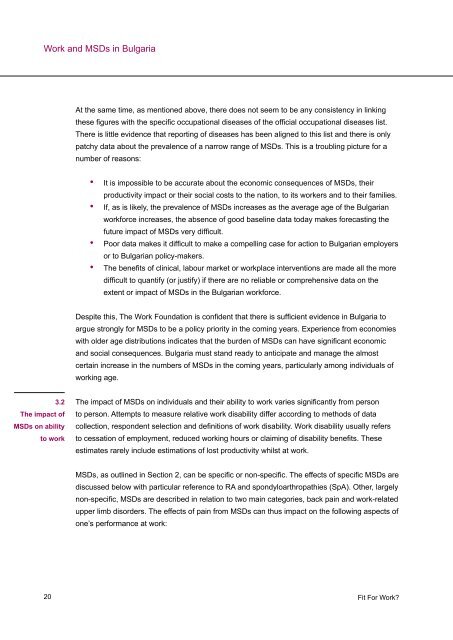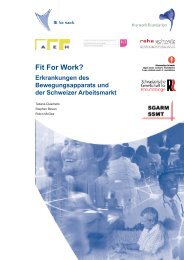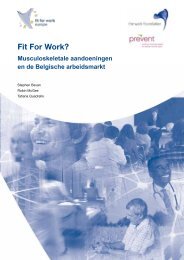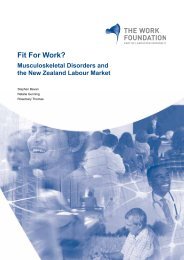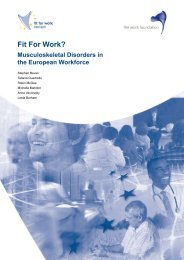FfW Bulgarian report (English language) - Fit for Work Europe
FfW Bulgarian report (English language) - Fit for Work Europe
FfW Bulgarian report (English language) - Fit for Work Europe
You also want an ePaper? Increase the reach of your titles
YUMPU automatically turns print PDFs into web optimized ePapers that Google loves.
3.2<br />
The impact of<br />
MSDs on ability<br />
to work<br />
<strong>Work</strong> and MSDs in Bulgaria<br />
20<br />
At the same time, as mentioned above, there does not seem to be any consistency in linking<br />
these figures with the specific occupational diseases of the official occupational diseases list.<br />
There is little evidence that <strong>report</strong>ing of diseases has been aligned to this list and there is only<br />
patchy data about the prevalence of a narrow range of MSDs. This is a troubling picture <strong>for</strong> a<br />
number of reasons:<br />
• It is impossible to be accurate about the economic consequences of MSDs, their<br />
productivity impact or their social costs to the nation, to its workers and to their families.<br />
• If, as is likely, the prevalence of MSDs increases as the average age of the <strong>Bulgarian</strong><br />
work<strong>for</strong>ce increases, the absence of good baseline data today makes <strong>for</strong>ecasting the<br />
future impact of MSDs very difficult.<br />
• Poor data makes it difficult to make a compelling case <strong>for</strong> action to <strong>Bulgarian</strong> employers<br />
or to <strong>Bulgarian</strong> policy-makers.<br />
• The benefits of clinical, labour market or workplace interventions are made all the more<br />
difficult to quantify (or justify) if there are no reliable or comprehensive data on the<br />
extent or impact of MSDs in the <strong>Bulgarian</strong> work<strong>for</strong>ce.<br />
Despite this, The <strong>Work</strong> Foundation is confident that there is sufficient evidence in Bulgaria to<br />
argue strongly <strong>for</strong> MSDs to be a policy priority in the coming years. Experience from economies<br />
with older age distributions indicates that the burden of MSDs can have significant economic<br />
and social consequences. Bulgaria must stand ready to anticipate and manage the almost<br />
certain increase in the numbers of MSDs in the coming years, particularly among individuals of<br />
working age.<br />
The impact of MSDs on individuals and their ability to work varies significantly from person<br />
to person. Attempts to measure relative work disability differ according to methods of data<br />
collection, respondent selection and definitions of work disability. <strong>Work</strong> disability usually refers<br />
to cessation of employment, reduced working hours or claiming of disability benefits. These<br />
estimates rarely include estimations of lost productivity whilst at work.<br />
MSDs, as outlined in Section 2, can be specific or non-specific. The effects of specific MSDs are<br />
discussed below with particular reference to RA and spondyloarthropathies (SpA). Other, largely<br />
non-specific, MSDs are described in relation to two main categories, back pain and work-related<br />
upper limb disorders. The effects of pain from MSDs can thus impact on the following aspects of<br />
one’s per<strong>for</strong>mance at work:<br />
<strong>Fit</strong> For <strong>Work</strong>?


